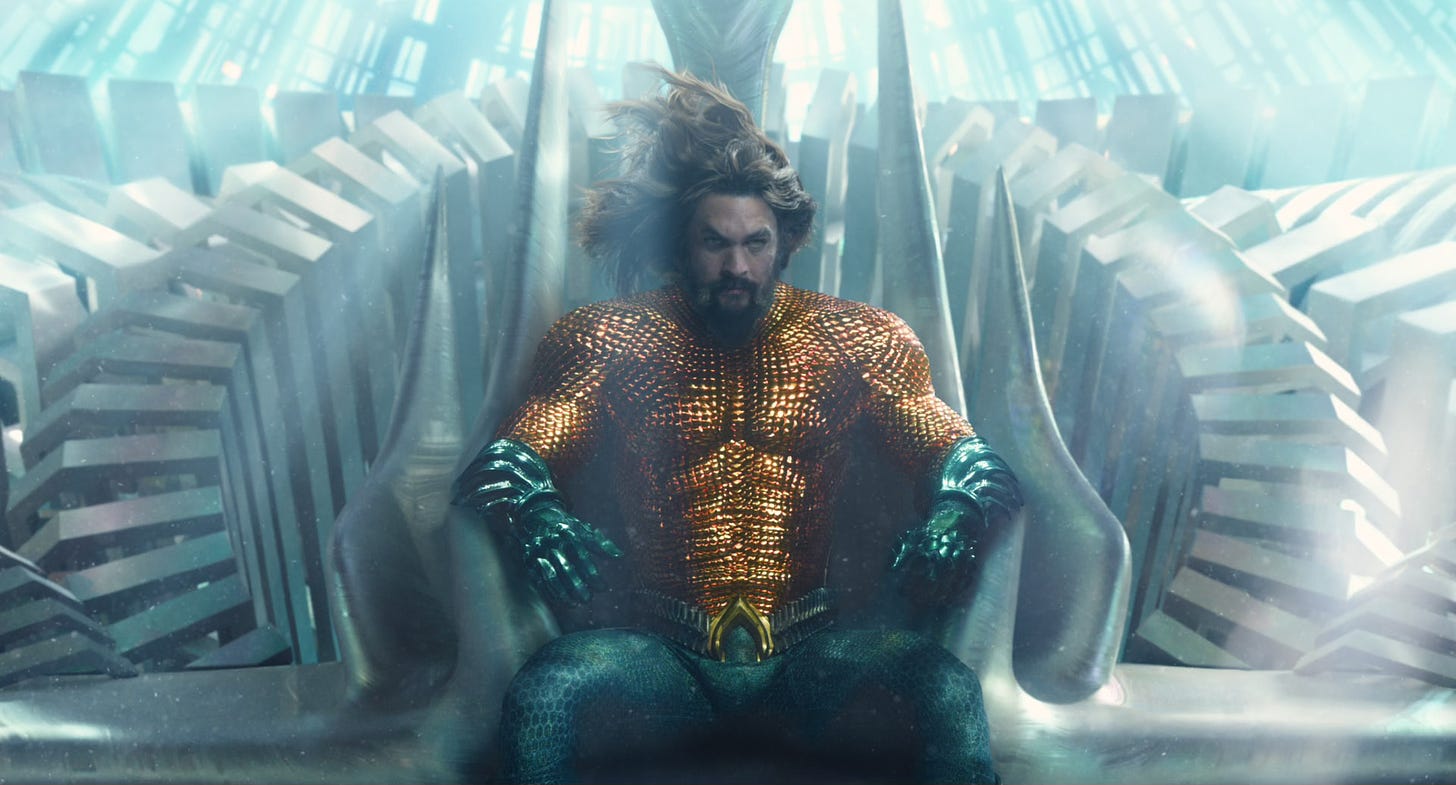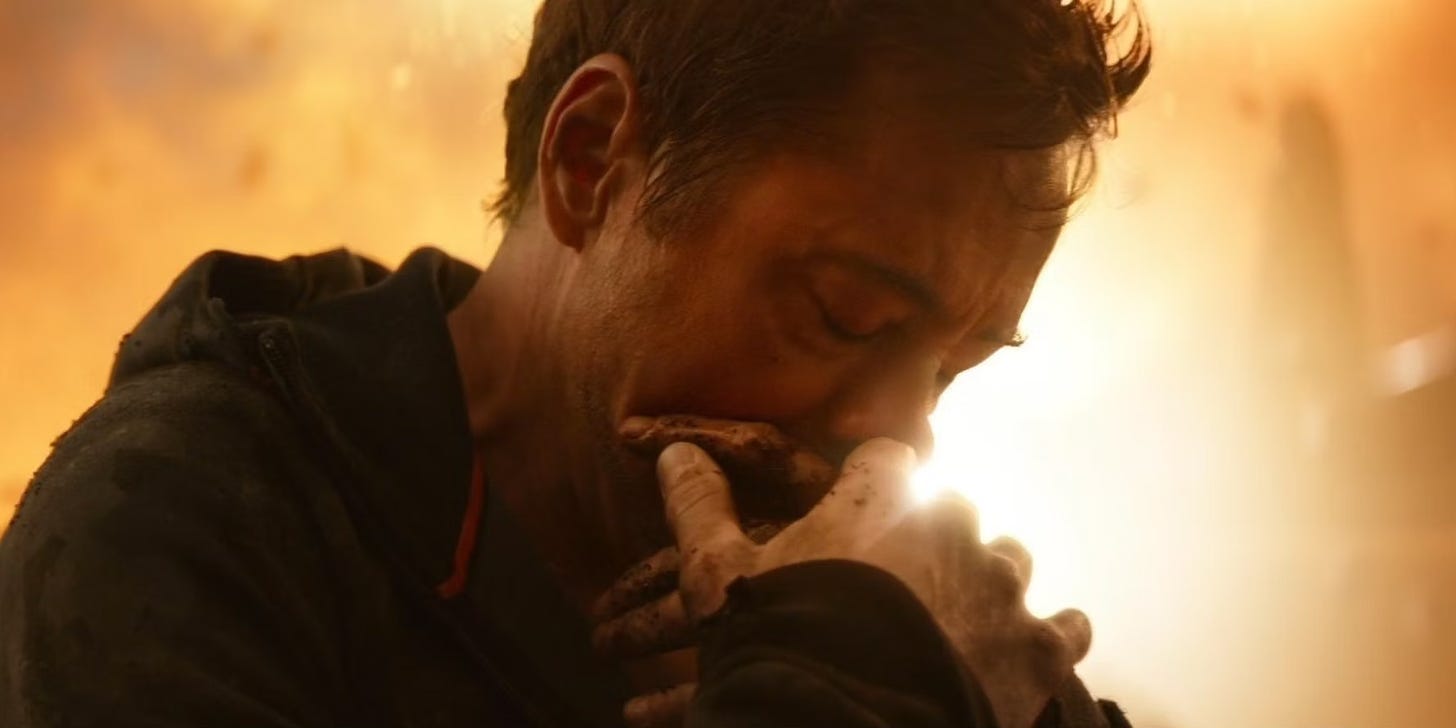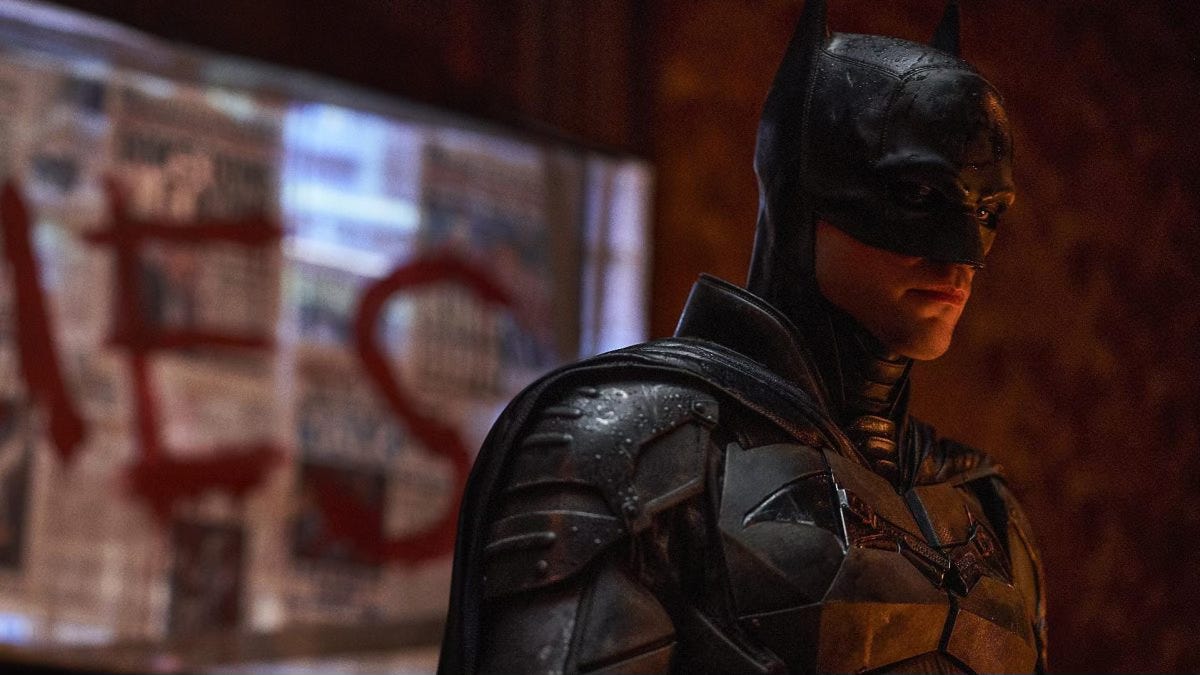In 2015, I was on a panel at Dragon Con about superhero movies. A question that came up more than once was, “When will the superhero bubble burst?” Even in a crowd of people who were interested in superhero movies, there was a sense of disbelief that so many of these movies were being made, and that there’s no way the trend could last. At the time, my fellow panelists and I answered that there was no signs of the trend slowing down—but now, eight years later, the bubble has burst. The superhero boom that arguably began in 2008 with the one-two punch of Iron Man and The Dark Knight is now over. Audiences have lost interest in the genre.
There were only two successful superhero movies in 2023. The first was Spider-Man: Across the Spider-Verse, the sequel to an Oscar-winning and beloved animated movie, and the other was Guardians of the Galaxy, Volume 3, the trilogy capper of a series where you never needed a lot of superhero knowledge to simply go on James Gunn’s sci-fi adventure with his group of intergalactic misfits. The tale of 2023’s superhero movie was more about massive flops. Warner Bros. was so thirsty for a hit that they touted The Flash as one of the greatest superhero movies ever made. The film, which reportedly cost over $200 million, barely crossed $270 million worldwide, far less than it needed to make up not only its budget, but also the prints and advertising costs. What was supposed to be the big reset event for DC movies didn’t attract fans and made a very loud thud, which was only lessened by the studio’s Barbie breaking records less than a month later.
Disney and Marvel faced a reckoning twice over. First, while Ant-Man and the Wasp: Quantumania had a successful opening weekend, it plunged in its second weekend, showing that word-of-mouth had turned toxic. The film was billed as the debut for Marvel’s next major villain, Kang the Conqueror, but instead became another dud in Marvel’s long line of underwhelming post-Endgame work. While Guardians 3 may have raised the studio’s hopes slightly, they knew The Marvels needed more work and pushed the movie back from July to November. It didn’t help. The Marvels had the worst opening in Marvel history, despite serving as a sequel to Captain Marvel, a movie that made over a billion dollars worldwide in 2019.
The final nail in the coffin is this weekend’s returns on Aquaman and the Lost Kingdom, which crawled to about $40-45 million over a holiday weekend. That’s less than the $47 million The Marvels made last month for its opening weekend, and a far cry from the $67.9 million the first movie made back in December 2018. Like The Marvels, the Aquaman sequel will come nowhere close to the billion-dollar marker of its predecessor. While it would have been studio malpractice not to push for a sequel to a superhero movie that made over a billion dollars worldwide, we can now see that audiences weren’t exactly eager to see the continuing adventures of these characters.
So why did audiences cool so dramatically on superhero movies? And does this mean that the genre is dead? I have two ideas on why superhero cinema hit a wall this year, and what the future of superhero movies will look like.
Too Many Heroes
The first argument is pretty obvious: The market got oversaturated. Once Marvel started breaking records over and over again with the Marvel Cinematic Universe, everyone wanted to do crossovers, and every studio that had superheroes (Warner Bros. and Sony) wanted a ton of superhero movies. But Marvel had the secret sauce the other studios lacked. However you feel about Zack Snyder’s superhero movies, it’s clear from watching them that he got put on an accelerated timeline to make Justice League (DC’s equivalent of The Avengers), so he didn’t have the benefit of giving central characters their own movies like Marvel did with Thor and Captain America: The First Avenger. While I don’t think Snyder’s deconstructive approach and WB’s meddling helped anything, audiences never really sparked to the DC movies in the same way as Marvel’s output. Over at Sony, their Spider-Man movies kept going so badly that they eventually made a deal with Marvel to relaunch the character while the studio tooled around with the “Spider-Man Cinematic Universe” to mixed results (Venom was a hit while Morbius…was not). But this arms race, with Marvel also growing its output to several movies a year (plus the addition of TV series in 2021) only served to overwhelm the audience1.
Unsurprisingly, studios took the wrong lessons from first The Avengers and then Avengers: Endgame. The Avengers made studios think that the audience wanted interconnected stories, but not only were those difficult to produce, they also never added up to much. King Arthur: The Legend of the Sword and Robin Hood both started out as attempts at interconnected movies before the studios threw up their hands and just churned out slightly modernized versions of these classic (and public domain) heroes.2 Marvel thought that Endgame signaled a firm interest in its characters rather than a culmination and off-ramp for the audience of casual fans that powered the studio’s hits. Marvel has spent the last four years trying to rekindle that enthusiasm, and they only came close with Spider-Man: No Way Home, a film that positioned itself as a post-pandemic event3 as well as cross-generational crossover bringing together three different Spider-Men.
For all the talk about how Marvel movies use the comics at the backbone of their work, the studio forgot an important caveat about the comics industry: it needs to be rebooted consistently because readers get overwhelmed and lose track of the stories. The crossover novelty has now become a burden to audiences who don’t want to have to watch six-hour TV shows so they can care about a two-hour movie. There is now too much Marvel stuff, and that compounds the problem with too much superhero stuff. Studios thought people cared about franchising, but that’s really only something the devoted fans follow, not casual moviegoers. People want a simple pitch about why a movie will be entertaining, and saying it’s the “next chapter” isn’t enough anymore. Everything is a next chapter, and the book is already too long.
No One Will Save Us
Superheroes are a form of escapism. They tell us that someone with more power than us will act benevolently on our behalf. They are not the cruel, fickle gods of old, but the post-war, Americanized do-gooders who may have their own problems, but they always do what’s right.
It’s not difficult to see why superhero movies took off after 9/11. Part of that was simply technological advancement (I don’t think you could have made a decent Spider-Man movie before CGI), but it’s no big surprise that audiences were amped to see superheroes like Spider-Man and the X-Men save the day. While audiences weren’t going to see every new superhero movie (the 2000s are littered with superhero flops like Catwoman, Ghost Rider, Daredevil, etc.), there was enough of an appetite to keep making them, especially when there was potential for massive hits like The Dark Knight and Iron Man.
Part of the acceptance of Marvel over DC is that Marvel movies were ultimately upbeat and hopeful. Zack Snyder, who previously directed a pretty faithful adaptation of the deconstructionist comic Watchmen, saw characters like Superman and Batman through the same lens, which meant his heroes were a lot darker and less given to upbeat tones (reading through his “Snyderverse” plans, it appears his endgame was to start his heroes at low points, and then through the phases of his cinematic universe build them up into hopeful avatars). But perhaps it’s no surprise that people just wanted to watch hopeful movies now when we existed in the aftermath of not only an attack on U.S. soil, but also two ongoing wars that didn’t seem to make us any safer.
But now there are people graduating college who weren’t even alive when 9/11 occurred. They read about it like my generation read about the assassinations of the 1960s: something our parents witnessed, but we only experienced through books and documentaries. A big audience for superhero movies grew up with the movies but weren’t fully aware of why these films may have sparked with the American consciousness in the first place. Films like The Avengers and Man of Steel recalled images of 9/11, and it was nice to think that if some alien “other” came out of nowhere and attacked a major city, someone would come to save us and stop the attacker.
COVID changed this dynamic in a way where heroics no longer clicked as well. You can’t punch a virus. When viruses are used as plot devices in action movies, the whole point is to stop the virus before the world suffers. COVID wasn’t an enemy that could be easily defeated. Instead, it exposed the various systemic fault lines in our society that left millions of people dead. In Avengers: Endgame, all it took was a snap to bring back the people who died. COVID showed us that even when there’s a miracle of science like a vaccine that arrives in less than a year, it will only cause further conflict because there’s more money and power in dividing people than uniting them. How do you return to heroes who punch away their problems? I don’t think it’s an accident that one of the biggest movies of 2023 is about a scientist who ends up ignored, discarded, and pessimistic about the fate of the world despite his monumental effort to save it through superior technology.
Fewer Heroes
When superheroes were at their height and people asked how many of these movies could exist, some compared the success to Westerns. As I previously wrote, Westerns have a lot more latitude in their plots and tropes than Marvel has with superhero movies. Also, Westerns eventually did decline, and while they still make them today, we’re far from the genre’s peak output. And that’s okay! We probably don’t need dozens of Westerns a year, and these days we get some pretty interesting stabs at the genre like The Power of the Dog and Hell or High Water.
Studios are in an awkward place because they’ve banked so much on IP that they can’t stop making superhero movies. But as this past year has shown, they need to take their foot off the gas. It’s one thing for Warner Bros. to not make a new Batman movie (and they are; The Batman: Part II is due out in 2025), but I don’t think anyone is going to raise a fuss if they hold off on making a new Aquaman or Flash movie. If anything, I think James Gunn, who now co-runs DC Studios, is going to have to rethink his entire Phase I plans, because while people will certainly show up for his Superman: Legacy, I question the wisdom of making movies of The Authority and Swamp Thing. It’s not even that I doubt James Gunn’s storytelling ability as much I as I doubt the audience interest to see a big, interconnected superhero universe again.
Marvel will likely need to scale back as well. Trying to resurrect characters like Iron Man and Black Widow would be the wrong move since it only hurts the back catalog of movies, and it doesn’t solve the problem that people want to feel invested in these stories, not cheated by cheapening the deaths of these heroes. There’s only one Marvel movie slated for 2024 (Deadpool 3, which will probably be a hit since there’s a low bar to understanding Deadpool, and this one will reunite him with Hugh Jackman’s Wolverine). But even something that’s supposed to be a marquee title for Marvel, the upcoming Fantastic 4, will likely be an uphill battle as audiences continue to wonder, after two versions of this quartet of superheroes, why this latest attempt is worth a shot.
My guess is that we see a greater emphasis on household name superheroes like Superman, Batman, Spider-Man, and maybe the X-Men, but far less pulling from the B- and C-list tier of heroes unless studios can find a way to tell those stories for far less money, which is tough since superheroes tend to rely on a lot of VFX. The days of throwing $200 million at a movie about The Flash are over, and that’s liberating.
Audiences shouldn’t be hemmed in by just one genre. It was easy to bemoan the blockbuster output of the 80s and 90s following Hollywood’s renaissance of the 1970s, but those blockbusters still allowed for some wild concepts as well as diversity on a studio’s overall slate that catered to more than just one taste. Marvel believed it could be all things to all people, and now we can see that it was a phase. That’s not to diminish the studio’s massive success, but nothing lasts forever. In 2023, audiences showed they were willing to return to theaters, but they’re going to demand something different. They want thoughtful directors like Greta Gerwig and Christopher Nolan telling them stories in a way they weren’t expecting. Superhero stories kept trying to build themselves for the next chapter without realizing that that eventually you hit “The End.”
This isn’t to mention all the other superhero stuff floating around on TV that wasn’t connected to the movies, but still demonstrated some kind of demand as seen with CW’s “Arrowverse” as well as largely disconnected Marvel shows like Agents of S.H.I.E.L.D. and the Marvel/Netflix series. However, it should be noted that in the era of Peak TV, the only superhero show that really made a cultural and critical splash was HBO’s Watchmen.
I also think both movies are kind of good!
Even though as we now know the pandemic still wasn’t over, and COVID will never really leave us, especially as people reject the vaccines that would actually stop COVID.






